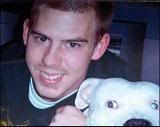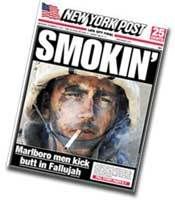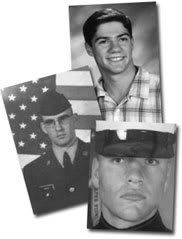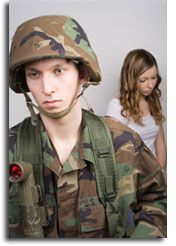An informative and in depth piece on combat-related posttraumatic stress disorder appeared this weekend in The Spectrum out of St. George, (Southern) Utah.
In addition to a brief history of PTSD, and a look at how the book Down Range: To Iraq and Back is being used to help troops in the combat zone deal with the stress of war, you'll read how one Vietnam veteran recently came to terms with the PTSD that had been tailing him (yet that he refused to believe existed) since his return home decades ago. A solid piece of reporting that challenges those who believe PTSD is hogwash to take another look at their own reasons for denying its existence.
Click on 'Article Link' below tags for more...
From The Spectrum:
Despite the signs, 57-year-old Steve Cantonwine spent the last 34 years believing his symptoms were simply part of his personality - one that had been steeled by the rigors and scenes of the Vietnam War. "To me, there wasn't anything wrong with me. I was a Marine. I didn't believe in post-traumatic stress disorder. 'They' were just a bunch of people that were whining and crying for sympathy," said Cantonwine.
But his wife, KayAnne, always knew something had a grip on him, though she didn't have words to explain their experiences. So the two blindly worked their way through, daily facing and unknowingly dealing with the symptoms of PTSD. "I don't think you can see and do the kinds of things you have to do in war to survive and not be affected in some way. They can't ever go back to the way things were, too many things have happened. But there's healing that takes place," said KayAnne.
As soldiers now serving in today's foreign wars prepare to return home, families like the Cantonwines, along with the medical community and military officials, are sharing their knowledge and experiences with PTSD and offering resources and education to soldiers, their families and the community.
PTSD, the piece continues, is not only for those who've served in combat.
Events leading to PTSD include plane or train crashes, vehicle accidents, cave collapses, sexual abuse, rape, domestic violence and other trauma. But the differences in healing and symptom management may vary for individuals depending on the severity, length and intensity of the event.
Cantowine, a Marine who'd returned from two tours in Vietnam in 1973, had shown signs of PTSD for decades, but it wasn't until 2004 that he realized he was having problems coping.
After he left the Iron County Sheriffs Office, Cantonwine began work as an over-the-road truck driver. During the long hauls, depression set in and in April of 2004, the second trigger hit. Cantonwine, along with his best friend - a fellow Vietnam veteran - was involved in a rollover outside Coeur d'Alene, Idaho.
The two events, a major life change coupled with a traumatic event - both triggers for PTSD - sent Cantonwine reeling. He struggled through nightmares that echoed the dreams that once plagued him when he first returned home from the war and he battled suicidal thoughts and tendencies. "I didn't feel like there was anything left for me. One was to be a Marine. One was to be a cop, and being a cop was taken from me," he said.
Those events landed Cantonwine in the doctor's office for medical assessments where his primary care provider quickly cued into his condition and recommended treatment for PTSD.
At first, he refused to believe that he had PTSD, denial being a common defense mechanism. His wife, however, could see that the doctors were on to something.
"I had a lot of signs as I look back on it," Cantonwine said, recalling symptoms of the last 30 years. Signs from uncontrolled bouts of anger that included scenes of road rage to an obsession with adrenaline that he sought out through employment as a deputy, EMT and as a hospital volunteer. "Some vets had drug and alcohol problems. Steve's was adrenaline. That's what fed him. It was like a combat rush," said KayAnne.
And his authoritative qualities as a Marine and deputy, at times, carried over to loved ones. "He expected perfection from co-workers and family. I think it goes back to 'If you don't do things right, people might get killed.' There wasn't a lot of room for excuses," said KayAnne.
Of all the symptoms, it was the anger that worried his family most. "We never would know what would make him angry," said KayAnne, noting that at times her husband's ire would last for several weeks. Cantonwine's anger never led to physical violence or abuse, but his tension was hard to live with and often left the family on edge.
When Cantowine finally reached out for help, he also found acceptance and a feeling of 'fitting in' that had been elusive in the civilian world.
Cantonwine traveled to the VA hospital in Denver to receive treatment and still attends group therapy sessions. "He always felt like a fish out of water in the civilian world and all of a sudden he was surrounded by people who felt the way he felt," said KayAnne.
And Cantonwine appreciates the opportunity to learn skills to manage his symptoms. In the past year, he has missed only one group session, which was for surgery on May 3 when doctors removed a 2-pound cancerous tumor from his abdomen, possibly linked to Agent Orange exposure. "We don't sit and talk about specific memories. I don't have to tell them what my flashbacks are, what nightmares I'm having. But we're able to sit there and offer support to one another," he said.
Despite frustrations with the VA's bureaucratic process, the treatment and ongoing healing Steve has received have become welcome blessings for the Cantonwines. "Now things are so good. Steve's learned how to manage it and he's healing," said KayAnne.

The Silver Lining
The silver lining to this journey is, of course, how the struggles of our Vietnam vets can be lessons for learning how to do better with the next generation of warriors returning home from combat. Cantowine wants to ensure that we learn the lessons, and not repeat the same mistakes.
"People have woken up and Vietnam vets primarily brought it out into the forefront," said Cantonwine. "I don't want to see anybody go through what I went through or see anyone put their family through what I did unknowingly."
"I think we've come to a place where you can support the soldier without supporting the war and it's too bad we didn't know that in Vietnam," said KayAnne.
This isn't to discount the fact that there are very real problems that still face our returning veterans as they move towards reintegrating into civilian life.
Despite the gains made in recent years, the strain of transitioning home today is as great as ever on soldiers and their families. "It wasn't easy and it's not going to be for this new set of war veterans," said KayAnne. "I think the biggest thing for the vets is the stigma that they perceive in asking for help. They all want to think they're just fine and haven't been affected by anything."
As a wife of a Marine, KayAnne had to learn the delicate balance of simply being there for her husband and listening without prying when he returned home. And for healing to occur, Andrews and Cantonwine say vets need to be heard. "Hearing it sometimes isn't pleasant. Vietnam vets, nobody wanted to hear their stories, what happened to them. It was such an unpopular war that they soon learned not to talk about it," said KayAnne.
Today, Barbara Stringham is anxiously counting the days until her son returns home with the Utah National Guard's 2nd Battalion, 222nd Field Artillery, which has served a year in Iraq.
While her son was home on leave, Stringham found herself struggling with the balance between her own instinct as a mother to nurture and her son's need for space and need to handle things on his own. "They've just served in open-hand combat. They've seen death and destruction. They don't know to receive that nurture from a mother. They're soldiers. They're supposed to be tough. Some of these guys are going to just need to break down and the public needs to know that's OK. Heck, we as family members sometimes need to break down," Stringham said.
And while family members like Stringham say they may not fully comprehend all that their soldiers have been through, they know lasting changes have taken place. "I just hope that he doesn't go through the mental anguish that you hear so prevalent from soldiers. It's scary as a parent because you're at a disadvantage. You don't know where to turn for the help they need," said Stringham, a member of the Triple Deuce family support committee that assists families during their soldier's absence.
Though Stringham wants her son to feel open to talking with her, she's prepared for him to set the pace. "You don't want to pull it out of them. In time they'll share, but they have a lot to cope with. And also I think it's something of them not having to relive it. When he's home and he's home for good, he wants it to be behind him and not have to relive it, he doesn't want to have to relive it over and over and over again," she said.
Stringham and other family members say their focus will center on one thing as soldiers return home, integrating them back into the society that they served and getting them back into their daily routine. Families are also hopeful the military and VA will continue to support soldiers who served in military action.
Though communities like St. George are preparing for top-notch celebrations upon their return, Stringham's looking ahead to the coming weeks and helping the soldiers adjust. "That initial homecoming day will be full of hoopla and pageantry - and that may carry through for the next few weeks. But afterwards, that's when the help really, truly needs to be there in the next months and years ahead," Stringham said.
Be sure to read the rest of the piece for an IM interview with 1st Lt. Bryan Hofheins, physician assistant of the Utah National Guard, 2nd Battalion, 222nd Field Artillery, and an interview with Gaylan Springer, chaplain for the 222.
And consider sending your thanks to The Spectrum for providing us with such rich coverage of this topic.

Related Posts

 Recently, a sculptor pointed me in the direction of her
Recently, a sculptor pointed me in the direction of her 
 It didn't take me long to know without any hesitation whose story I needed to open the book with: James Blake Miller, aka the Marlboro Marine. I'd begun covering the issue of combat PTSD and our returning troops in September of 2005 and Miller made a deep impression on me when he came forward only a few short months later, in January 2006, to tell the world of his struggle with PTSD.
It didn't take me long to know without any hesitation whose story I needed to open the book with: James Blake Miller, aka the Marlboro Marine. I'd begun covering the issue of combat PTSD and our returning troops in September of 2005 and Miller made a deep impression on me when he came forward only a few short months later, in January 2006, to tell the world of his struggle with PTSD. From the
From the 
 Two new studies have arrived on the scene this first week of the New Year. Main
Two new studies have arrived on the scene this first week of the New Year. Main  Important
Important  Snapped by embedded Los Angeles Times photographer Luis Sinco, tagging along with Charlie Company, 1st Battalion, 8th Marines in Fallujah on November 9, 2004, this photo would run in 100 newspapers worldwide. The Times gives us an update on how the iconic Marine is doing. Through both a
Snapped by embedded Los Angeles Times photographer Luis Sinco, tagging along with Charlie Company, 1st Battalion, 8th Marines in Fallujah on November 9, 2004, this photo would run in 100 newspapers worldwide. The Times gives us an update on how the iconic Marine is doing. Through both a  Yesterday's ABC World News Tonight covered the important topic of veterans health issues. In
Yesterday's ABC World News Tonight covered the important topic of veterans health issues. In  If you're a returning combat veteran having some difficulty readjusting to civilian life, you may be wondering what's going on. Why am I angry all the time? Why am I feeling detached?
If you're a returning combat veteran having some difficulty readjusting to civilian life, you may be wondering what's going on. Why am I angry all the time? Why am I feeling detached? 
